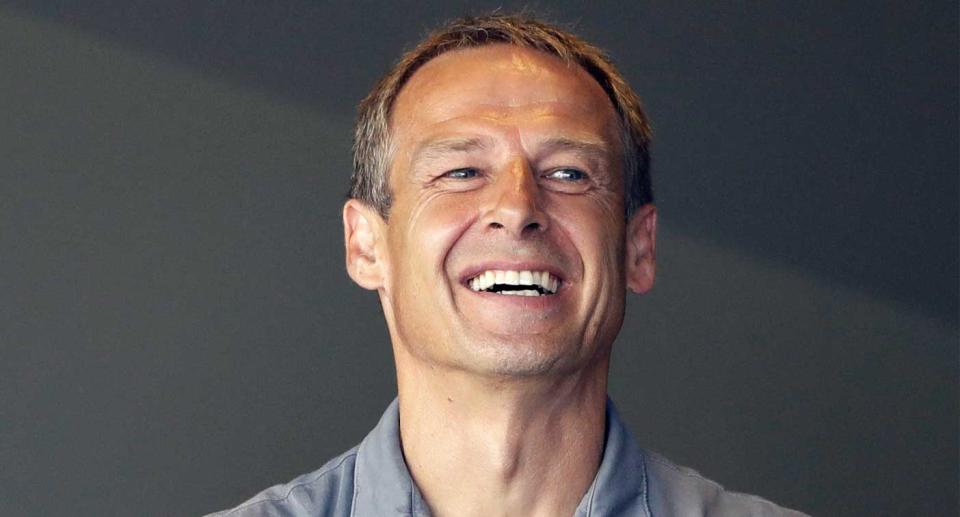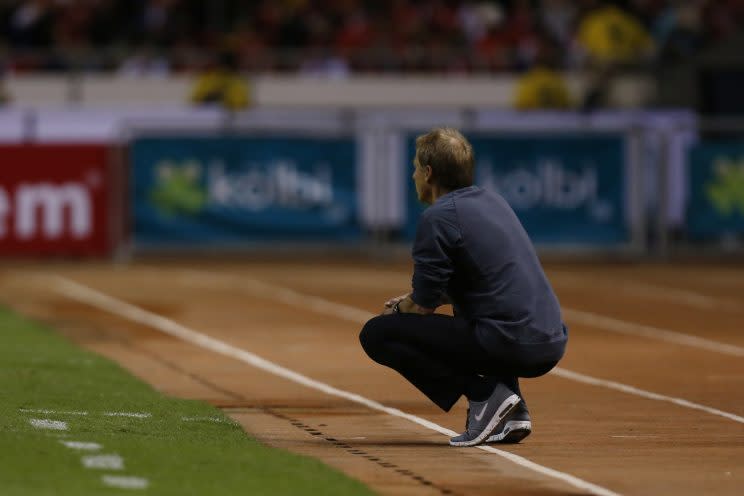Jurgen Klinsmann said some strange stuff about his firing by U.S. Soccer

“The fact will remain we were let go because we lost two games.”
Those words hang heavily through the rest of Jurgen Klinsmann’s first interview since his November firing as United States men’s national team head coach and U.S. Soccer’s technical director. The Los Angeles Times spoke to the German coach in Costa Mesa, Calif., and noted that the typically friendly, chipper and optimistic Klinsmann “appeared worn and his smile forced.”
Nonetheless, if he felt defeated from being let go from the job that he inarguably committed a great deal to over the course of his 5½-year run, he seems to retain a strange perspective on his sacking.
Because Klinsmann and his staff were most definitely not “let go because we lost two games.” Yes, the first two matches of the final phase of World Cup qualifying were the symptoms that led to the diagnosis that Klinsmann had to go. But they were not the disease.
We’ve spent a lot of time in this space analyzing what went wrong in the Klinsmann Era. But it’s worth unpacking this, because it grossly misrepresents what really went down.
Klinsmann’s firing was much longer in the making than those fateful defeats to Mexico on Nov. 11 (1-2) and Costa Rica on Nov. 15 (0-4). And it had far more to do with the stasis and stagnation in recent years, when it became apparent that he could not deliver on the vision he had presented in August 2011, just after his hiring. There was no “proactive” play, no high pressure, no next level reached, no better integration of Hispanic-American players. The Klinsmann revolution never came off.
What’s worse, after five years, the team seemed to be regressing. After a disappointing 2015 Gold Cup, Klinsmann was somewhat redeemed by a run to the semifinals of the 2016 Copa America Centenario – although there were a few ugly losses at the tournament on home soil as well. But in the Costa Rica defeat last November, while a single game, it was clear that the sample size of failure was larger than one.

Which brings us to the next odd utterance by the former head coach. “It was, in a way, an incomplete picture that was given,” Klinsmann told the L.A. Times. “And you will never see if anything will be complete because it’s just kind of cut off. It just shows you how abrupt the business is. Incomplete may be the best word.”
Wait. Come on. You had more than five years. In soccer time, that’s a century. If you’re not delivering results after half a decade, you really don’t have a leg to stand on trying to argue that you weren’t given time.
Finally, Klinsmann claimed credit for laying “the ground for another generation of players. But that cycle of players, they will need time to grow.”
This is hardly something to boast about. When you’ve been in charge of a national team as long as he was, turning over the generations isn’t an accomplishment, it’s just a basic part of the job. And you could argue that with 18 months to run until the World Cup, he was probably too slow in getting younger players firmly established into the lineup. The reason that they need “time to grow” is that they haven’t yet been given enough time – by him.
It’s understandable that Klinsmann wants to cast as favorable a light as possible on what was, in the end, a rocky tenure. He said in the interview that he’s on the lookout for his next job, and so he’s got a CV to buff up to a high shine.
Yet you can’t help but feel that his view of things has fallen prey to the same delusions that ultimately seemed to cause his failure in the job. A national team coach, eventually, has to be sort of pragmatic. There isn’t much time to build, let alone overhaul, an entire national landscape and craft a new mindset.
And in a historically patient and conservative program like U.S. Soccer’s, you aren’t fired on account of just two games.
Leander Schaerlaeckens is a soccer columnist for Yahoo Sports. Follow him on Twitter @LeanderAlphabet.



